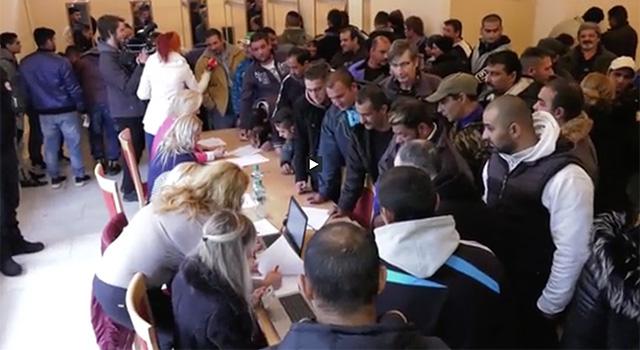Slovak ironworks prefers to hire Romani citizens instead of foreign nationals

Some Slovak firms have decided to give long-term unemployed Romani people jobs instead of attracting foreigners from abroad for them, a decision being made at a time when more than 80 000 jobs remain unfilled in the country. “We see potential in employing Romani people,” said Tibor Gregor, executive director of the 500 Club in Slovakia.
“This is a domestic work force that can address the needs of Slovak industry. The state will save money on the cost of re-qualifications and welfare – moreover, the idea has a social dimension,” Gregor said.
The current pilot project of employing 50 long-term unemployed Romani people is being run by the Podbrezová Ironworks. “When the correct approach is taken we are discovering that there is great potential in employing Romani people,” said Vladimír Soták, director-general of Podbrezová’s steel production.
“We should be paying our hard-earned money to our own citizens instead of to the citizens of third countries who come and go. Our citizens will be here to stay,” Soták said.
Over the last two years, 27 000 unemployed persons with just basic education, most of whom were Romani, found jobs on the domestic market. “It is being demonstrated that when firms take the correct approach, even problematic groups know how to acquire work habits,” said Slovak Labor Minster Ján Richter.
“For example, among the Roma what has proven effective is when their work attendance is monitored by a person from their own community who enjoys natural respect among them – colloquially these people are called vajdas,” Richter said. His ministry has allocated EUR 420 000 for the pilot project implemented in Podbrezová.
Fifty Romani workers are currently undergoing a three-month training in the metallurgical factory. “The candidates will be chosen in collaboration with the Labor Office and the employer is paying the costs of the training in full,” said director-general of the Slovak Labor Office Marián Valentovič.
“After they are hired, half of the salaries are paid by the state and half by the Podbrezová Ironworks,” Valentovič explained. The pay for the new workers will be EUR 872 gross monthly, far above the level of the minimum wage, which is currently EUR 480 monthly.
“Our aim is actually to show citizens of Romani origin the advantages of permanent employment. For that reason we are aiding them with arranging payment plans with collections agents and making psychologists available to them,” said Valentovič.
As many as 400 000 Roma live in Slovakia. Their full integration into employment could solve the country’s problem with a labor shortage in the long run.
The application process at Podbrezová happened on 4 December and as many as 500 Romani people attended. Of those who applied, the 50 best candidates will be chosen in collaboration with four Romani vajdas.
Those community members will instruct the Romani hires in how to work in different jobs such as tube reducers, controllers, or packers over the next three months. The vajdas themselves are subcontractors to the factory.
Podbrezová has also pledged to keep these new jobs on line for a minimum of 15 months. In Slovakia the current average official unemployment rate is 5.23 %, the lowest rate ever in the history of the independent republic.
